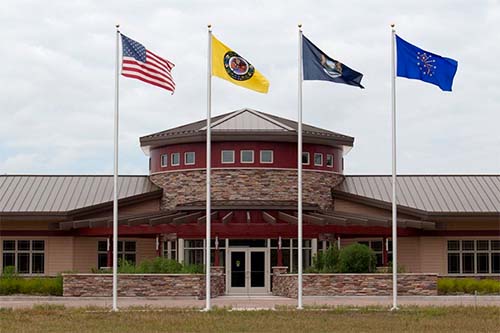
- Details
- By Native News Online Staff
The Pokagon Band of Potawatomi and its Four Winds Casinos donated 1,000 food boxes to help those in need have a nice Easter Sunday meal.
The distribution was coordinated by Feeding America® West Michigan and the Food Bank of Northern Indiana through 11 different locations. Each food box contained ham,corn, green beans, potatoes au gratin, and banana bread.
The Pokagon Band and its Four Winds Casinos previously donated 1,000 food boxes in November of 2022 for Thanksgiving and 1,000 food boxes December 2022 for Christmas.
“We are very proud that we can continue our tradition of giving this Easter holiday,” Rebecca Richards, tribal chairwoman of the Pokagon Band of Potawatomi Indians said. “It is our hope that these food boxes are a source of comfort to those in need. We’d also like to thank our partners at Feeding America, the Food Bank of Northern Indiana and the 11 locations for coordinating the distribution.”
Feeding America is the largest hunger-relief organization in the United States. Through a network of more than 200 food banks, 21 statewide food bank associations, and over 60,000 partner agencies, food pantries and meal programs, the organization provided 5.2 billion meals to tens of millions of people in need last year.
More Stories Like This
Native News Weekly (August 25, 2024): D.C. BriefsUS Presidents in Their Own Words Concerning American Indians
Native News Weekly (January 18, 2026): D.C. Briefs
Federal Judge Orders ICE to Halt Use of Pepper Spray, Arrests of Peaceful Protesters in Twin Cities
Tunica-Biloxi Cultural Leader John D. Barbry Walks On
Help us defend tribal sovereignty.
At Native News Online, our mission is rooted in telling the stories that strengthen sovereignty and uplift Indigenous voices — not just at year’s end, but every single day.
Because of your generosity last year, we were able to keep our reporters on the ground in tribal communities, at national gatherings and in the halls of Congress — covering the issues that matter most to Indian Country: sovereignty, culture, education, health and economic opportunity.
That support sustained us through a tough year in 2025. Now, as we look to the year ahead, we need your help right now to ensure warrior journalism remains strong — reporting that defends tribal sovereignty, amplifies Native truth, and holds power accountable.
 The stakes couldn't be higher. Your support keeps Native voices heard, Native stories told and Native sovereignty defended.
The stakes couldn't be higher. Your support keeps Native voices heard, Native stories told and Native sovereignty defended.
Stand with Warrior Journalism today.
Levi Rickert (Potawatomi), Editor & Publisher


